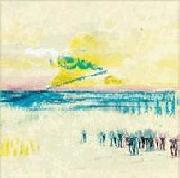|
Contributor
Reviews 35
Soundoffs 37
Album Ratings 2898
Objectivity 68%
Last Active 12-13-22 11:46 pm
Joined 01-15-10
Review Comments 3,344
| Obscure Band, Ranked I: Sgt.
In which I, as you would correctly assume from the title, rank the songs of an obscure band. First up (though I’m not sure if I’ll do this with any regular frequency) is mostly-instrumental jazz/prog/post-rock band Sgt.! Across their 4 albums, these guys have released some of my favorite songs of the post-rock genre, some of my favorite songs in general, and even my favorite song of all time. Here I’ll be running down each of their studio album tracks (minus intros or interludes which are instead attached to their corresponding songs) with the hope of spreading the word about this fantastic band. All English titles are unofficial and translation corrections are certainly welcome. | | 22 |  | sgt.
Capital of Gravity
“Epsilon” - While most of Sgt.’s 9+ minute “epics” are methodically crafted and among their best material, “Epsilon” is an odd one out, an uncharacteristically sloppily strung-together mish-mash that doesn’t quite find enough of a common thread to feel like a tightly-composed song or even an interestingly-improvised jazz piece. Ending Capital of Gravity on a lackluster note, it’s easily the band’s weakest track. Maybe the band’s only true poor track, in fact. | | 21 |  | sgt.
Birthday
“221B Baker” - A short funk interlude that splits the band’s best record in two, “221B Baker” drags the listener out of the repetitive romp of “Arabesque” before the album’s final punches but doesn’t accomplish much else. With “Breathless” arguably a more fitting interlude between the aforementioned track and the record’s incredibly strong closing trio of songs, “221B Baker” mostly feels like unnecessary baggage, though its grooves and distorted background noise can intrigue on their own merit for the first couple of listens. | | 20 |  | sgt.
Capital of Gravity
“Ant’s Planet” - A bit of an experimental oddity for Sgt., “Ant’s Planet” mostly revolves around playful, bouncy piano, Hitoshi Oono’s tight drumming, and some electronic background noise. It’s a pleasant combination of sounds, but it feels drastically out of place on Capital of Gravity, especially stuffed between the moody “Tears of Na-Ga” and the slow start to “Epsilon.” | | 19 |  | sgt.
Perception of Casualty
“Haru Kaze” (“Spring Breeze”) - A smooth and relaxing piece of violin and keyboard-based ambience, “Spring Breeze” serves its purpose of bridging the middle gap of Perception of Causality, though it too feels a little disjointed. Its opening piece drags a little too long, and though it picks up a bit once it reaches its halfway point, the song still lacks lasting punch and would have been much better condensed. | | 18 |  | sgt.
Stylus Fantasticus
“Koe wo Dashite Kangaeru Houhou” (“How to Think Aloud”) - A common pitfall of Sgt.’s lesser proper tracks is the feeling that they take a bit too long to get somewhere. This one not only feels disproportionally long (its ending is far better than its rather dull buildup), but the grooves it’s centered around aren’t all that memorable, easily making it the least interesting offering on Stylus Fantasticus. | | 17 |  | sgt.
Capital of Gravity
“Tears of Na-Ga” - Though based around some fantastic hypnotic piano and violin, “Tears of Na-Ga” simply drags on a little too long at a pace that gets too comfortable with itself to truly progress forward in a rewarding way. Its mixing also detracts from its potential punch towards the end, though I have to admit the song almost gets away with its repetition on the merit of its moodiness alone. | | 16 |  | sgt.
Stylus Fantasticus
“Byakuya” (“White Night”) - While “White Night” isn’t necessarily leaps and bounds better than its preceding entry, it at least evokes a stronger sense of hypnotic atmosphere with tighter composition and a more memorable violin lead. The piano work adds a nice touch, and as always, Oono’s drumming drives the song’s less interesting sections along at a swift pace. | | 15 |  | sgt.
Perception of Casualty
“………” - Starting with a brooding, ominous bass pattern and percussive clatter, Sgt.’s untitled closer to Perception of Causality begins to showcase what the band can do at their finest. Slowly building up noise to a distressing clamor just before the 5-minute mark, the song then transforms into a beautifully tense mystery propelled by its own momentum, the violin, bass, drums, guitar, and horns working in harmony for a majority of its length. Only towards its end does the perfection dissipate, as the band transitions into a more free-form section which concludes the album with a little less impressive force than it had up until then hinted at. | | 14 |  | sgt.
Capital of Gravity
“Kalliope”/”Apollo Program” - Capital of Gravity is undoubtedly Sgt.’s weakest release, but it still features a crowning moment of awesome in their discography; “Apollo Program” takes off with no warning and features some delicious distorted guitar and great interplay between it and the violin. Oono drums the hell out of the end of the song, crashing with each crunchy hit in one of Sgt.’s most intense climaxes. “Kalliope” serves as an acceptable introduction with a neat violin effect, but not much more. | | 13 |  | sgt.
Stylus Fantasticus
“Saisei to Misshitsu” (“Resuscitations and the Secret Room”) - Another track that jumps right into the action, “Resuscitations…” is one of the band’s better improvisational tracks, with frenzied sax and sick grooves from Oono and bassist Kouji Akashi. While guitar is sparingly used in most of Sgt.’s material (and this isn’t necessarily an exception) it adds an extra boost to this mid-disc pick-me-up. “Resuscitations…” is somehow at once both tactful and free-spirited, a delicate balance of headstrong and controlled songwriting. | | 12 |  | sgt.
Stylus Fantasticus
“Mu no Yuragi” (“Fluctuation of Nothing”) - Contrary to its title, “Fluctuation of Nothing” neither fluctuates all that much nor consists of empty space. This song is an outright romp, filled with energy, suspense, and bounds of passion. It’s one of the group’s most well-balanced tracks, and it functions as a wonderful closer to Stylus Fantasticus. In fact, its only real downfalls are that it too is arguably a little overstuffed and that it has the hopeless task of following up…well, we’ll get there. | | 11 |  | sgt.
Birthday
“Arabesque” - “Arabesque” may be another repetitive song that unfortunately goes on a bit longer than it should, but it’s otherwise fairly distinct from the rest of Sgt.’s work. It’s direct, punctuated, and loud, with plowing brass and a vibe of both mystique and bravado, somewhat reminiscent of Kanno’s work with The Seatbelts on the Cowboy Bebop soundtrack. (That comparison hook you yet?) Its violin bits are among Mikiko Narui’s most memorable, and the song’s background ambience is faint in the mix but vital to its energy. It may be Birthday’s weakest full song, but the fact that it’s this high up should probably indicate something about how great that album is, and at #11, “Arabesque” still squeaks its way into Sgt.’s top half of tracks. | | 10 |  | sgt.
Stylus Fantasticus
“Shuujin-tachi no Jirenma-Geimu” (“The Dilemma-Game of Snatched People”) - Built on one of Akashi’s best bass riffs, “Dilemma-Game” is a wailing powerhouse that smacks the listener in the face after Stylus Fantasticus’ misleadingly calm introduction. Right before the track is about to give in to its own repetitiveness, Narui’s screeching electric violin surfaces and lifts the intensity up a notch, perking the listener’s ears and sending them on a wild ride for the remainder of the track. | | 9 |  | sgt.
Birthday
“Furuboketa Ehon” (“Time-Worn Picturebook”) / “Cosgoda” - A pointless 22-second intro can’t prevent “Cosgoda” from being one of the most perplexing and adventurous songs the band has released to date. No amount of music theory has been able to clue me in on what time signatures each member is using here. Unlike some of the band’s other work of this length which simply runs out of ideas by a certain point, “Cosgoda” somehow finds a way to up itself with each passing minute, promising a lot at the start of a record that will indeed go on to showcase the band’s most well-rounded songwriting. Oono deserves some huge props on this one, holding everything together with his restless drum skills, but each member brings their all to the table here and in every song from this point onward. | | 8 |  | sgt.
Stylus Fantasticus
“Subarashiki Hikari” (“Magnificent Light”) - Revolving around panned delayed guitar and some absolutely sublime piano, “Magnificent Light” kicks off Stylus Fantasticus with a subdued, comparatively quiet introduction and doesn’t waste a single second across its quick 4 minutes. One of the most beautiful and shortest tracks the band has penned to date, it serves as their most concise opener and a strong gateway track that balances the group’s jazzy and post-rock tendencies wonderfully with a better-mixed flourish than most of their material. | | 7 |  | sgt.
Perception of Casualty
“Moewe” - At 5 minutes, “Moewe” is another one of the most concise post-rock tracks the band has put out, bursting out of the gates with nary a hint of trepidation from the trailed-out end of “Spring Breeze”. It’s also one of the group’s most confident and triumphant tunes, driven along with grace due to some of Narui’s best violin work and some of the best chemistry you’ll hear from the band’s early material. | | 6 |  | sgt.
Birthday
“Raiman Arufa no Mori” (“Lyman Alpha Forest”) - It may come between the more in-your-face “Cosgoda” and “Arabesque,” but “Lyman Alpha Forest” doesn’t waste its potential to be a gripping track in its own right. Its fragile piano is a highlight of the song’s first half, but once again, each instrument is played to its most tactful and passionate possible effect. Narui’s violin commands the song’s transition period which suddenly takes a more brooding and cathartic Godspeed or MONO-esque turn before picking up the tempo one last time and closing with a final somber piano chord. It’s one of the band’s most underrated songs, an exemplary criss-cross of jazz and post-rock, and an insanely well-mixed tune that will continuously give you something new to notice on dozens of repeat listens. | | 5 |  | sgt.
Birthday
“Kimi wa Yume wo Miteiru Yume ga Kimi wo Miteiru” (“You Are Looking at a Dream That is Looking at You”) - Instead of taking the loud approach with their final tracks like on all their previous releases, the band instead chose to end Birthday with this curveball. Slowly stacking up soulful percussion under Narui’s soaring violin melody, “You Are Looking at a Dream…” escalates passively at first, but by the song’s halfway point it becomes clear that this is one of the band’s most jubilant pieces of music. The darting piano, simplistic bass, unrestrained drumming, and calming violin crescendo to one of the best climaxes in all of post-rock, and the song releases with just enough falling action so that the final note resounds in your head with a sense of fulfilled pride. This track is unarguably the band’s best closer, and it earns a well-deserved spot in this top 5 despite some tough competition. | | 4 |  | sgt.
Birthday
“Breathless”/”Zweiter Weltkrieg” - Sgt.’s only studio track with vocals, “Zweiter Weltkrieg” is a blitzing (heh) jazz extravaganza about World War II (I would assume) with restless harmonized bass vocals passionately delivered over - and I know I’m repeating myself a lot by this point - perfectly written instrumentation. As the vocals get more and more desperate with each passing second, the song ebbs and flows with pinpoint precision alongside them. “Breathless” would be a worthless interlude at any other place in Sgt.’s discography, but its muffled radio static and explosions are an appropriately unsettling introduction to a song named after the bloodiest war in history. Furthermore, though Sgt. tends to thrive most when they stick to their guns, the inclusion of vocals here is pulled off way stronger than you’d anticipate, making it their most successful attempt at experimentation and one of their best songs, period. | | 3 |  | sgt.
Perception of Casualty
“Ban’nou-kan ni Kansuru Sobyou” (“A Sketch on Universal Sensation”)/”Ginga no Shasou Kara” (“From The Galaxy’s Car Window”) - Sgt. have two epics with “galaxy” in the title, and both are among the best post-rock songs ever written. “From The Galaxy’s Car Window” is an accurate title; this 13-minute anthem sounds like the audible manifestation of seeing the universe fly by you on a trip from the farthest reaches of outer space back to good ‘ol planet Earth. Transitioning from an uneasy bass-driven introduction to an even more nervous middle portio, the song’s first third crawls along before Narui’s violin lifts it up and loops over itself with reverberated plucking, the rest of the band slowly joining in with -among other things - some of their most noticeable guitar work to date. Narui is truly the star of the show here though, and after a shout and one last brilliant movement, the song slowly recedes into the ambience of "Spring Breeze". A great early example of Sgt.'s brilliance. | | 2 |  | sgt.
Birthday
“Anata wa Watashi” (“You and I”) - At less than 4 minutes, “You and I” is a substantially more stripped-down and simpler song than its comrades in the top 3, but its shorter length and less overwhelming composition are hardly detriments. With one of the prettiest piano melodies I’ve ever heard, the track not only functions as a poignant follow-up to the ferocity of “Zweiter Weltkrieg” but also holds its own weight as the runner-up best piece of music Sgt. has ever recorded. Essentially only incorporating that rich piano and swirling strings, this track’s beauty is all the more pronounced with its minimal instrumentation, and if this little gem can’t succeed at wrenching your heartstrings, there may not be any hope for you. | | 1 |  | sgt.
Stylus Fantasticus
“Kioku no Shima no Tsuki” (“The Moon of Memory Island”)/”Ginga wo Kowashite Hatsuden Sho wo Tsukure” (“Destroy The Galaxy, Create The Power Plant”) - If “From The Galaxy’s Car Window” was a single trip through a living, breathing, cosmic universe, “Destroy The Galaxy, Create The Power Plant” and its 2-minute introductory counterpart “The Moon of Memory Island“ are its entire history, spanning from formless birth to tangible struggle to rapidly accelerating expansion to an implosion that sends everything reverting back to formlessness again. Any praise I could specifically give the songwriting is all stuff I’ve explained about Sgt. several times before now, and it’s all true, so I’m not sure I can possibly describe just how great “Destroy The Galaxy…” is and get my point across without hyperbole. I’ll leave it at this then: it’s a masterpiece unparalleled by any music I’ve ever heard and my favorite song of all time. Give it (and Sgt.) a shot. | |
ashcrash9
04.06.16 | There are likely some glaring errors in here but I'm too exhausted to notice them. Typo corrections would be greatly appreciated. Check out Sgt., yadda yadda yadda | user
04.06.16 | i regret this comment | CaimanJesus
04.06.16 | No do Megadeth | Friday13th
04.06.16 | "Destroy the Galaxy" is pretty good yeah |
|
